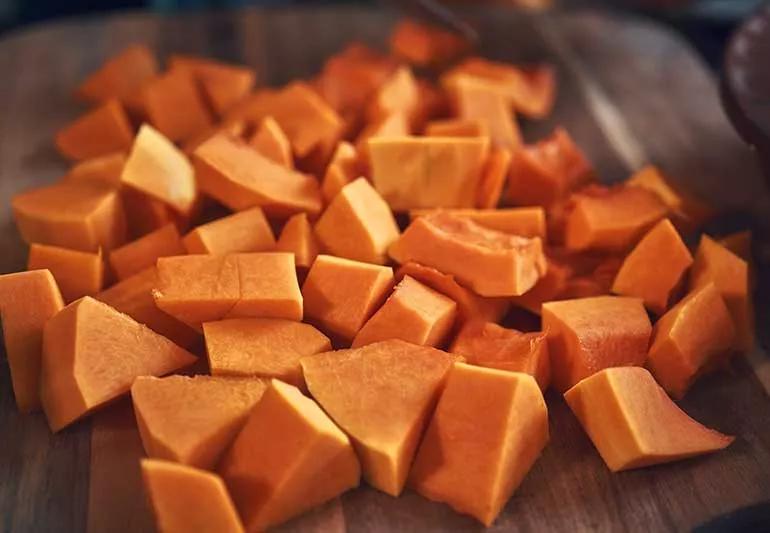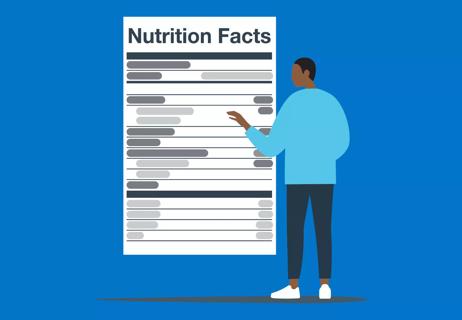Advertisement
This rich nutrient — found in more than just carrots! — turns into vitamin A in your body

Remember that old joke about carrots being good for your vision? That’s why you never see a rabbit wearing glasses!
Advertisement
Cleveland Clinic is a non-profit academic medical center. Advertising on our site helps support our mission. We do not endorse non-Cleveland Clinic products or services. Policy
Well, it’s kind of true. Carrots contain loads of the nutrient beta-carotene, which is good for your vision.
But there’s more to it. Lots of other favorite fruits and veggies are also good sources of beta-carotene, and the benefits go beyond strong vision.
“Beta-carotene gets converted into vitamin A in your body,” explains registered dietitian Carly Sedlacek, RD, LD. “It’s a great source of antioxidants and full of an anti-inflammatory properties, too.”
We talked with Sedlacek about beta-carotene’s benefits for your body and what foods are best choices to get your fill.
Beta-carotene is a type of nutrient known as a carotenoid, which means it’s a natural food coloring. Foods high in beta-carotene and other carotenoids tend to have deep, rich colors.
But beta-carotene does much more than make your plate more rainbow-esque.
Beta-carotene is a special kind of carotenoid known as a provitamin A carotenoid. That means it’s essentially a precursor to vitamin A.
“When it’s absorbed in your body, beta-carotene transforms into vitamin A in your intestines,” Sedlacek explains.
Some foods — like meat, fish and dairy products — contain a source of vitamin A called pre-formed vitamin A. But provitamin A carotenoids like beta-carotene come from a wide range of plant foods. (More on what foods those are in a bit.)
So, beta-carotene gives your body all the benefits of vitamin A, plus some additional body-boosting effects.
Sedlacek explains some of the top benefits of beta-carotene.
Antioxidants like beta-carotene help fight off damage to your body at the cellular level. That’s because beta-carotene acts as an antioxidant — meaning it helps keep free radicals (unstable molecules) from building up in your body and causing oxidative stress. And that’s really important because oxidative stress is linked to a number of chronic diseases, like cancer, heart disease, Alzheimer’s disease and more.
So, a diet rich in beta-carotene and other antioxidants can help ward off chronic illness.
Some nutrient-rich foods can help to lower inflammation throughout your body. And beta-carotene is one of the nutrients that provides an anti-inflammatory benefit.
Inflammation in your body is much like the swelling you get after an injury. Except on the inside. Like oxidative stress, chronic inflammation contributes to a host of chronic conditions.
A healthy diet rich in nutrients like beta-carotene can help keep your inflammatory response in check.
Advertisement
Probably one of the best-known benefits of beta-carotene is its effect on your vision.
“That’s what people always think of — beta-carotene equals carrots equals better eyesight,” Sedlacek notes.
That’s because of beta-carotene’s connection to vitamin A, which helps your brain to interpret light that hits your eye. Your body also uses vitamin A to keep your retinas healthy and prevent dry eyes.
Studies have suggested, too, that vitamin A is associated with reduced risk of cataracts as well as age-related macular degeneration (AMD), which is a loss of central vision in older people.
Beta-carotene is best known for giving some foods an orange hue. But not all beta-carotene-rich foods are orange. (Here’s looking at you, leafy greens.)
Check out the beta-carotene content of these foods:
| Food | Beta-carotene content (in micrograms/mcg) per cup |
|---|---|
| Sweet potato (baked) | 23,018 mcg |
| Carrots | 10,605 mcg |
| Butternut squash (cooked) | 9,369 mcg |
| Cantaloupe | 3,575 mcg |
| Romaine lettuce | 2,456 mcg |
| Red peppers | 2,420 mcg |
| Spinach | 1,688 mcg |
| Apricots | 1,696 mcg |
| Broccoli (cooked) | 1,449 mcg |
| Pea pods (cooked) | 1,216 mcg |
| Mango (fresh) | 1,056 mcg |
| Food | |
| Sweet potato (baked) | |
| Beta-carotene content (in micrograms/mcg) per cup | |
| 23,018 mcg | |
| Carrots | |
| Beta-carotene content (in micrograms/mcg) per cup | |
| 10,605 mcg | |
| Butternut squash (cooked) | |
| Beta-carotene content (in micrograms/mcg) per cup | |
| 9,369 mcg | |
| Cantaloupe | |
| Beta-carotene content (in micrograms/mcg) per cup | |
| 3,575 mcg | |
| Romaine lettuce | |
| Beta-carotene content (in micrograms/mcg) per cup | |
| 2,456 mcg | |
| Red peppers | |
| Beta-carotene content (in micrograms/mcg) per cup | |
| 2,420 mcg | |
| Spinach | |
| Beta-carotene content (in micrograms/mcg) per cup | |
| 1,688 mcg | |
| Apricots | |
| Beta-carotene content (in micrograms/mcg) per cup | |
| 1,696 mcg | |
| Broccoli (cooked) | |
| Beta-carotene content (in micrograms/mcg) per cup | |
| 1,449 mcg | |
| Pea pods (cooked) | |
| Beta-carotene content (in micrograms/mcg) per cup | |
| 1,216 mcg | |
| Mango (fresh) | |
| Beta-carotene content (in micrograms/mcg) per cup | |
| 1,056 mcg |
Because beta-carotene helps your body create vitamin A, it’s an important part of a healthy diet.
Let’s explain.
The upper limit of vitamin A recommended for adults over the age of 19 is 3,000 mcg per day.
That’s because vitamin A can be dangerous in excessive amounts.
Why? Vitamin A is a fat-soluble vitamin, which means that your body stores it in your liver and fatty tissue to be used later. So, vitamin A stays around in your body longer than water-soluble vitamins like vitamin C and B vitamins. Those pass quickly through your body and get sent out in your pee.
Because vitamin A sticks around to be used later, there’s a risk to getting too much of it. That’s why vitamin A supplements are typically not recommended unless they’re being used under the supervision of a healthcare professional — too much of a good thing is just too much.
But beta-carotene will only be converted to vitamin A if your body needs it.
There’s one side effect of too much beta-carotene to note, though. Having too much beta-carotene in your diet can turn your skin a yellow-orange color. It can be more noticeable in people with lighter skin tones.
“It’s called carotenemia,” Sedlacek explains. “It’s not dangerous, but it can be a sign that you can cut down on some beta-carotene-rich foods and up your intake of other fruits and veggies. A variety of healthy foods is important to getting a good mix of nutrients to fuel your body.”
Great, you think, if beta-carotene is good for me and I don’t need to worry about toxicity, I’m sure there’s a pill for that.
Advertisement
And it’s true, beta-carotene supplements are available. But that doesn’t mean you should turn to the vitamin aisle to get your fill.
For starters, people who smoke cigarettes or who are exposed to asbestos in their work should avoid beta-carotene supplements, as studies have found them to be associated with a higher risk of lung cancer.
And for others, supplements still shouldn’t be your first route to upping your intake of beta-carotene.
“We always recommend food over supplements when we can. Eating plenty of fruits and vegetables should always be Plan A,” Sedlacek advises. “With supplements you really don’t always know what you’re getting because they’re not highly regulated.”
What’s more is that it takes your body a few extra steps to break down nutrients when they come in supplement form, as opposed to natural sources.
“It already takes your body some work to convert beta-carotene to vitamin A,” Sedlacek adds. “So, when you ask your body to first convert the nutrients from a pill into beta-carotene and then on to vitamin A, you can lose out on a lot of the benefits of the nutrients.”
Advertisement
Learn more about our editorial process.
Advertisement

What’s on your plate can either help power you through your day or put you in nap mode

Information on serving size, calories and nutrients can help you make healthy choices

Often labeled as ‘diabetes-friendly’ or ‘calorie-free,’ these sugar substitutes warrant caution

Repeating your meals can help simplify meal planning and counting calories, but it could also lead to boredom and nutritional deficiencies

Making certain food and lifestyle choices can help keep your battery full

Fiber-rich shirataki noodles may improve blood sugar, aid in digestion and help with weight loss

Reducing inflammation is key when you’re in a flare-up, but so is having a preventive nutritional plan in place when you’re not

The U.S. FDA prohibits HCG use without a prescription — and the hormone isn’t approved for weight loss at all

Focus on your body’s metabolic set point by eating healthy foods, making exercise a part of your routine and reducing stress

PFAS chemicals may make life easier — but they aren’t always so easy on the human body

While there’s little risk in trying this hair care treatment, there isn’t much science to back up the claims